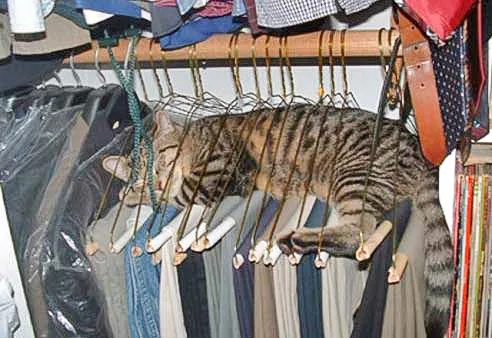Obviously, the question has been asked by a human with human perceptions. That I think is the point. To humans, cats can seem to enjoy snoozing and resting in uncomfortable positions and in uncomfortable ways and on uncomfortable substances. But to the cat they are not uncomfortable otherwise they wouldn't do it.
Here is a famous picture now in the public domain of a cat seemingly in an uncomfortable position where he is fully asleep! It is on an associated website - click here to see it.
 |
| I believe his name is Tigar. |
So, cats are more tolerant of these so-called uncomfortable positions or they might even find them comfortable. In fact, that is likely in many instances because if a cat is sleeping and resting in what appears to be an uncomfortable position to a human it has to be comfortable to them. If it wasn't they'd get up and change their position.
For example, initially it surprised me that my cat, Gabriel, likes to sleep across cables that are on my duvet. The duvet is very comfortable for him. It keeps him warm and it's soft but if there is cabling for my computer on the duvet he will sleep over the cabling and not select a part where there is no cabling. Very strange. Or is it? He just doesn't feel it or care about it.
One obvious factor is that the fur on a domestic cat creates a nice buffer or barrier between irregular surfaces and their skin. This must help to iron out any wrinkles on the surface which makes them less noticeable.
What about this? Should make you smile. From Twitter X.
And I'm going to speculate and say that one reason why domestic cats don't care about sleeping on a regular surfaces is because they've inherited this trait from their wildcat ancestor. Wild cats must, by default, sleep on rough surfaces sometimes such as stones or twigs and rough ground. They have to accept it. They might have found a nice den which is safe but the ground is rough. They prioritise the safety of the den over the rough ground and accept it.
The domestic cat has inherited this trait I would argue. And another reason why cats appear to be in uncomfortable positions because they are inherently very flexible. This once again goes to their wildcat ancestor. The wildcat has to be flexible to be a good hunter which requires being highly manoeuvrable, a good climber, able to keep balance well and being able to wriggle around and over obstacles. Flexibility is built into the domestic cat so when they look as if they are distorting themselves in a very uncomfortable way, it isn't uncomfortable for them.
Perhaps another reason why cats might accept uncomfortable positions is because the place where they have taken up the uncomfortable position is particularly warm. For example, cats sometimes sleep on computer keyboards. The computer gives off heat and maybe the keyboard is not particularly comfortable for their head but they accept it. Cats are very tolerant actually of many things. There brain processes input information differently to humans.
 |
| Image in the public domain. He is perfectly comfortable than you very much. |
I believe this is another factor in this discussion. The tolerance of the domestic cat. They tolerate cold very well and of course heat. Cats like it warmer than humans because their body temperature is higher than that of humans and once again, we have to refer to their wildcat ancestor, living in dry, arid conditions in North Africa.
Domestic cats are inherently inquisitive as well which is part of their hunting skills and mojo. When investigating things, they have to be flexible and agile. I'm back to agility and flexibility here which makes them more accepting of contorted positions.
All in all, cats don't mind being in uncomfortable positions as perceived by humans because they are not uncomfortable to the domestic cat.
This is about human perceptions. There are many instances where human perceptions can misguide the human about cat behaviour. And sometimes humans project onto their domestic cat companion their own thoughts and attempt to read their cat in a misguided way. This is all normal actually and to be expected. Domestic cats are often a member of the human family and treated as an equal. It's no surprise that they are sometimes regarded as little humans resulting in expectations that they should behave like a human!


No comments:
Post a Comment
Your comments are always welcome.
Note: only a member of this blog may post a comment.